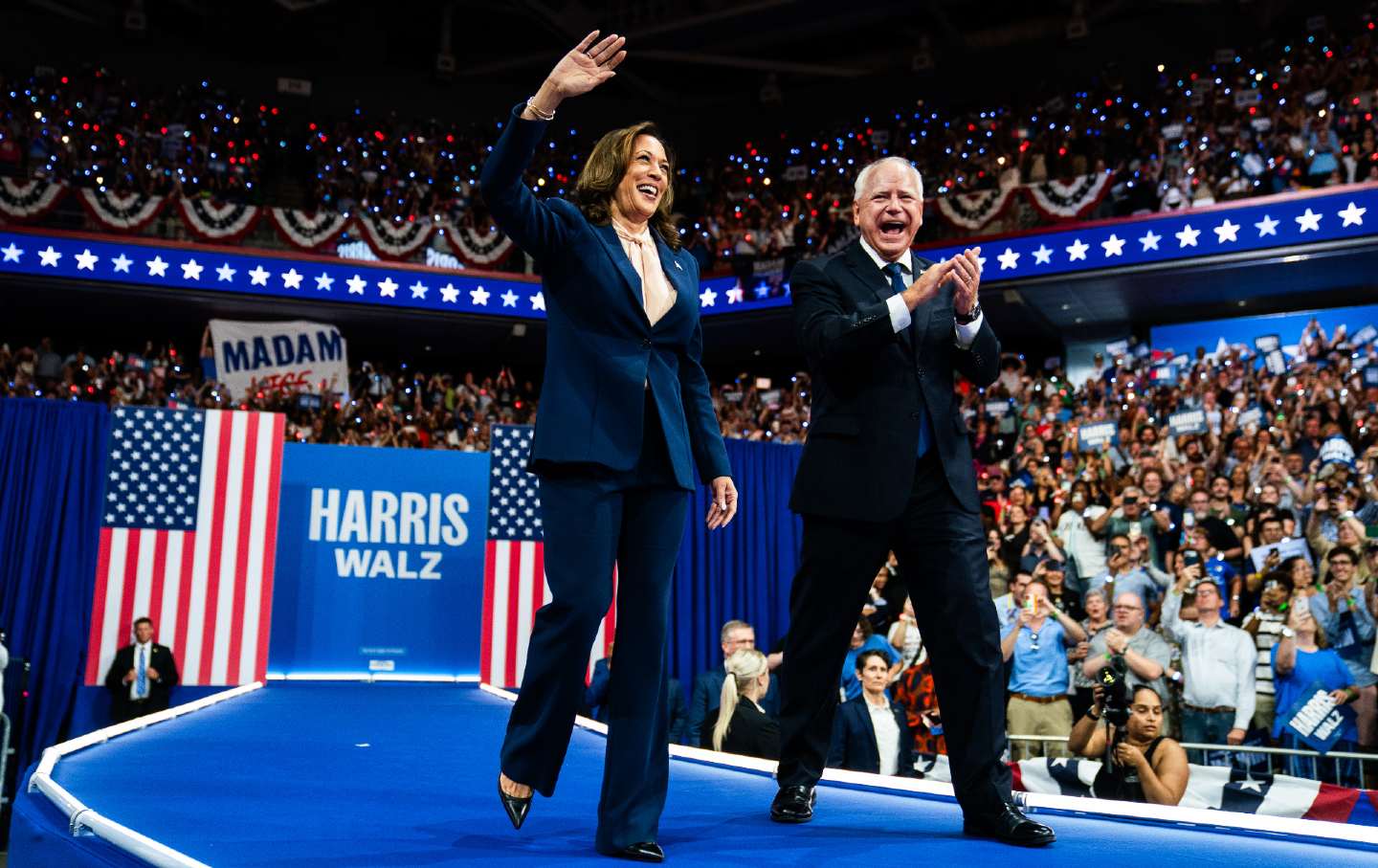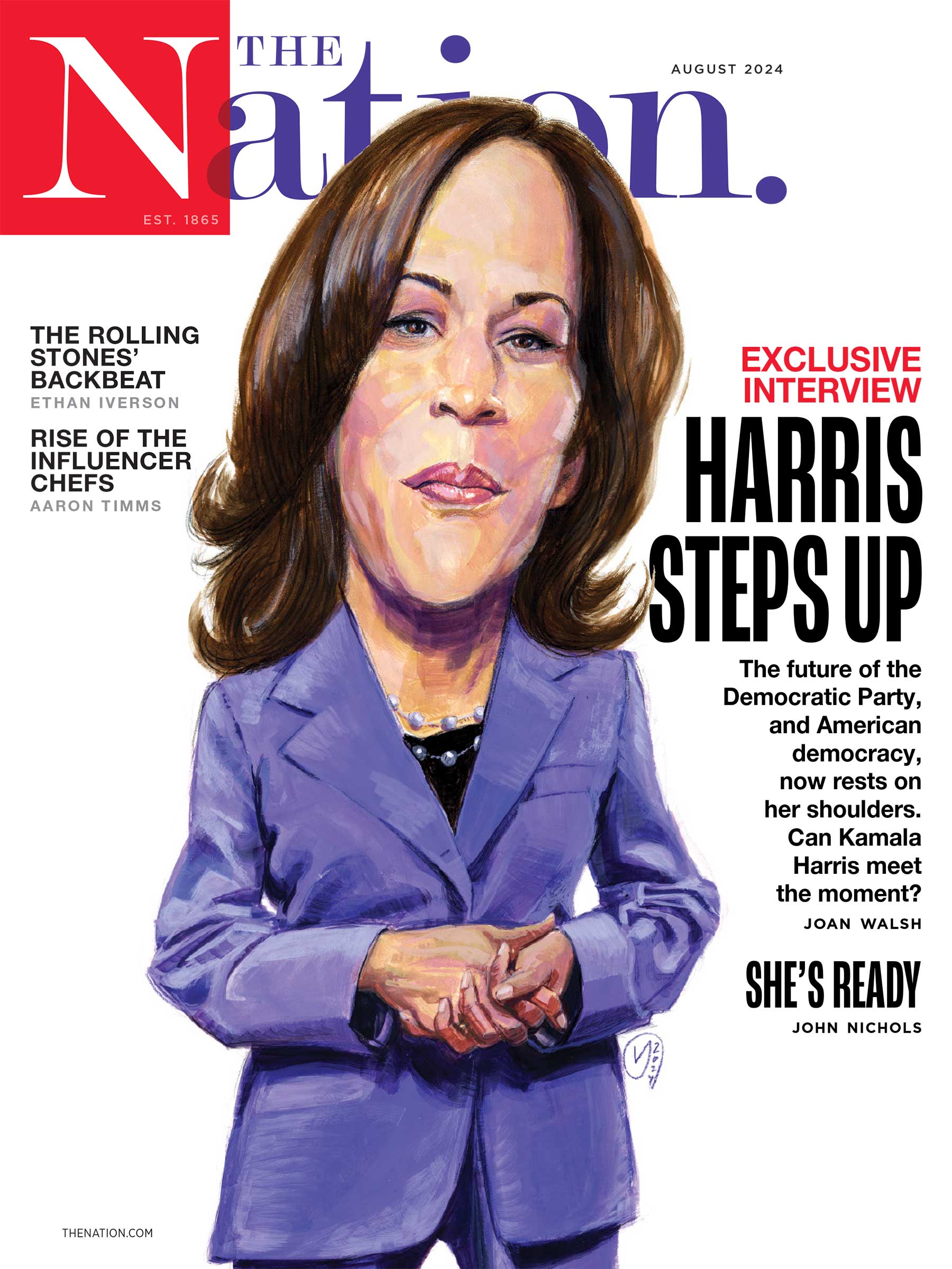
Politics
/
August 7, 2024
Democrats are going to have to cope with an unfamiliar emotion: hope.
Vice President Kamala Harris and Democratic vice presidential nominee Minnesota Governor Tim Walz during a campaign event at the Liacouras Center at Temple University in Philadelphia on August 6, 2024.
(Demetrius Freeman / The Washington Post via Getty Images)
Philadelphia—I can’t remember exactly when the cold lump of fear that had taken up residence in my chest the night of Joe Biden’s disastrous debate with Donald Trump began to dissolve. It might have been when I started walking to the Liacouras Center, Temple University’s big arena, a little after 2 pm—more than three hours before “Remarks” at the first ever Kamala Harris–Tim Walz rally were scheduled to start—and I found myself in a stream of people all walking in the same direction.
There were women in pantsuits, women in jeans, and women in brat-green dresses. There were men in Carhartt, men in board shorts (it was in the high 80s, with intermittent showers), and even—thanks in part to your correspondent—men in seersucker. We were old and young, gay and straight, all shapes and sizes and colors, and I found myself thinking of David Dinkins, New York’s late and often underrated first Black mayor, and his “gorgeous mosaic.”
Or it might have been when Josh Shapiro, the swing-state governor whom Harris passed over, took the stage and brought the hometown crowd of 10,000 people to its feet. “Let me tell you about my friend Kamala Harris.”
Current Issue

Praising the nominee—who had become the party’s official choice earlier in the day—as “courtroom tough…battle-tested and ready to go,” Shapiro reminded the crowd of the stakes in November: “Trump ripped away the freedom of millions of American women to make decisions about their own bodies.”
It was a theme he returned to again and again: “It’s not freedom to say you can go to work, but you can’t join a union.… Real freedom [means] you can marry who you love and be who you are.” Each time, the crowd responded with a roar: “We’re not going back!”
Or it could have been listening to the playlist before Harris took the stage, which segued from “Ain’t No Mountain High Enough” (Tammi Terrell was born and raised in Philadelphia) to “Respect” to “Dancing in the Streets” to “My Girl.” When the cheers died down and Harris reminded the crowd, “We are the underdogs in this race” and described the election as a referendum on “What kind of country do we want to live in?” and her search “to find a partner who can help build this brighter future,” it was clear that something extraordinary was happening in our country and in our politics.
Not because of any particular policy agenda. As this magazine, and indeed this writer, has often noted, the Biden-Harris administration delivered the most progressive domestic agenda in decades—yet still languished in the polls behind a convicted felon, adjudicated sexual abuser, and established grifter. And on foreign policy, where the Biden administration has backed Israel’s criminal war in Gaza and shown a consistent preference for bluster and belligerence over diplomacy or restraint, there is no reason to believe the change at the top of the ticket will change much. And, as the chants of “USA!” that punctuated Harris’s remarks indicated, there may not be the vast constituency demanding a new foreign-policy direction that those of us on the left would like to see.
What did seem to exist, and to begin to show itself on the streets of Philadelphia, is a constituency for hope, common decency, and a vision of the future where instead of banning books and hounding women over their personal decisions, Americans tell the Republican Party’s corps of eager inquisitors to “Mind your own damn business!” So that by the time Tim Walz thanked Harris “for bringing back the joy” and joked about JD Vance, “I can’t wait to debate the guy. That is—if he’s willing to get off the couch and show up,” I caught myself thinking, “She’s got this. They’ve got this.”
It may not last, of course. Even yesterday, there were darker moments. There were the eager cries of “Lock him up!” that came in response to Harris’s assurance that, as a veteran prosecutor, “I know Donald Trump’s type.” And there is the certainty that while yesterday’s festivities literally ended under rainbow skies, the next 90 days are bound to get ugly.
We all knew that. And even those of us who thought Hillary Clinton was a terrible candidate—the wrong person at the wrong moment with the wrong values for the country—can still feel the sting of election night 2016. But at the risk of belaboring the obvious, Kamala Harris is no Hillary Clinton. True, she is a woman—a Black and South Asian woman. But unlike Clinton, her choice of running mate indicates an ability to see the whole country—not just the coasts and the C-suites and the credentialed elite.
Because as much as this campaign offers, at least for some Harris supporters, a kind of do-over, the country, the candidate, and the Democratic Party have all changed since that nightmare of eight years ago. And if “freedom” seems like a surprising theme for a Democratic ticket, it’s also a reminder of how much has already been lost—to Trump’s Supreme Court majority and to his persistent malign presence in our public life. And of how much can still be lost—and won—in this sprint to November.
“We’re not going back!” For me, and I suspect for most of us in the arena yesterday, that was the most poignant cry, the most heartfelt cheer, and the most terrifying recognition of what’s at stake in this suddenly hopeful campaign. I kept thinking of the writer Meridel LeSeur’s admission in “I Was Marching” that, faced with the possibility of collective action, her instinctive response was fear: “a condition I had been in the habit of defending with various attitudes of cynicism, preciosity, defiance and hatred.” I knew all those attitudes well.
But some were bolder. In the line for the men’s room afterward, an older man shook his head in wonder and said, “We could have 16 years of this.”
Can we count on you?
In the coming election, the fate of our democracy and fundamental civil rights are on the ballot. The conservative architects of Project 2025 are scheming to institutionalize Donald Trump’s authoritarian vision across all levels of government if he should win.
We’ve already seen events that fill us with both dread and cautious optimism—throughout it all, The Nation has been a bulwark against misinformation and an advocate for bold, principled perspectives. Our dedicated writers have sat down with Kamala Harris and Bernie Sanders for interviews, unpacked the shallow right-wing populist appeals of J.D. Vance, and debated the pathway for a Democratic victory in November.
Stories like these and the one you just read are vital at this critical juncture in our country’s history. Now more than ever, we need clear-eyed and deeply reported independent journalism to make sense of the headlines and sort fact from fiction. Donate today and join our 160-year legacy of speaking truth to power and uplifting the voices of grassroots advocates.
Throughout 2024 and what is likely the defining election of our lifetimes, we need your support to continue publishing the insightful journalism you rely on.
Thank you,
The Editors of The Nation